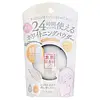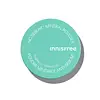What's inside
What's inside
 Key Ingredients
Key Ingredients

 Benefits
Benefits

 Concerns
Concerns

 Ingredients Side-by-side
Ingredients Side-by-side

Tranexamic Acid
AstringentTalc
AbrasiveMica
Cosmetic ColorantSilica
AbrasivePEG-8 Dimethicone
EmulsifyingCI 77120
Cosmetic ColorantZinc Oxide
Cosmetic ColorantMagnesium Myristate
Lauroyl Lysine
Skin ConditioningHydrolyzed Conchiolin Protein
Skin ConditioningThymus Extract
Skin ConditioningTitanium Dioxide
Cosmetic ColorantPearl Powder
Magnesium Ascorbyl Phosphate
AntioxidantSodium Hyaluronate
HumectantSqualane
EmollientRose Extract
Skin ConditioningRosa Rubiginosa Seed Oil
EmollientSynthetic Fluorphlogopite
CI 77891
Cosmetic ColorantCI 77491
Cosmetic ColorantButylene Glycol
HumectantAluminum Dimyristate
Emulsion StabilisingPhytosteryl/Isostearyl/Cetyl/Stearyl/Behenyl Dimer Dilinoleate
Skin ConditioningDiglyceryl Stearate Malate
EmollientMethyl/Phenyl Polysilsesquioxane
CI 77492
Cosmetic ColorantCI 77499
Cosmetic ColorantWater
Skin ConditioningTocopherol
AntioxidantPhenoxyethanol
PreservativeParfum
MaskingTranexamic Acid, Talc, Mica, Silica, PEG-8 Dimethicone, CI 77120, Zinc Oxide, Magnesium Myristate, Lauroyl Lysine, Hydrolyzed Conchiolin Protein, Thymus Extract, Titanium Dioxide, Pearl Powder, Magnesium Ascorbyl Phosphate, Sodium Hyaluronate, Squalane, Rose Extract, Rosa Rubiginosa Seed Oil, Synthetic Fluorphlogopite, CI 77891, CI 77491, Butylene Glycol, Aluminum Dimyristate, Phytosteryl/Isostearyl/Cetyl/Stearyl/Behenyl Dimer Dilinoleate, Diglyceryl Stearate Malate, Methyl/Phenyl Polysilsesquioxane, CI 77492, CI 77499, Water, Tocopherol, Phenoxyethanol, Parfum
 Reviews
Reviews

Ingredients Explained
These ingredients are found in both products.
Ingredients higher up in an ingredient list are typically present in a larger amount.
Mica is a naturally occurring mineral used to add shimmer and color in cosmetics. It can also help improve the texture of a product or give it an opaque, white/silver color.
Serecite is the name for very fine but ragged grains of mica.
This ingredient is often coated with metal oxides like titanium dioxide. Trace amounts of heavy metals may be found in mica, but these metals are not harmful in our personal products.
Mica has been used since prehistoric times throughout the world. Ancient Egyptian, Indian, Greek, Roman, Aztec, and Chinese civilizations have used mica.
Learn more about MicaSilica, also known as silicon dioxide, is a naturally occurring mineral. It is used as a fine, spherical, and porous powder in cosmetics.
Though it has exfoliant properties, the function of silica varies depending on the product.
The unique structure of silica enhances the spreadability and adds smoothness, making it a great texture enhancer.
It is also used as an active carrier, emulsifier, and mattifier due to its ability to absorb excess oil.
In some products, tiny microneedles called spicules are made from silica or hydrolyzed sponge. When you rub them in, they lightly polish away dead skin layers and enhance the penetration of active ingredients.
Learn more about SilicaTocopherol (also known as Vitamin E) is a common antioxidant used to help protect the skin from free-radicals and strengthen the skin barrier. It's also fat soluble - this means our skin is great at absorbing it.
Vitamin E also helps keep your natural skin lipids healthy. Your lipid skin barrier naturally consists of lipids, ceramides, and fatty acids. Vitamin E offers extra protection for your skin’s lipid barrier, keeping your skin healthy and nourished.
Another benefit is a bit of UV protection. Vitamin E helps reduce the damage caused by UVB rays. (It should not replace your sunscreen). Combining it with Vitamin C can decrease sunburned cells and hyperpigmentation after UV exposure.
You might have noticed Vitamin E + C often paired together. This is because it is great at stabilizing Vitamin C. Using the two together helps increase the effectiveness of both ingredients.
There are often claims that Vitamin E can reduce/prevent scarring, but these claims haven't been confirmed by scientific research.
Learn more about Tocopherol